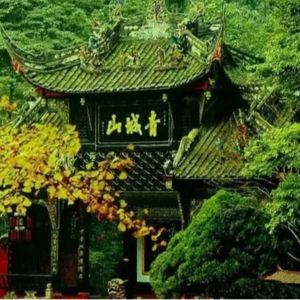大家都熟悉和知晓青城山,相信很多听众也去过青城山旅游。但是,你知道用英语如何来描述青城山的历史,和它在中国文化上的影响吗?让我们一起,用英语来学习一下吧!
青城山作为道教圣地,在中国传统文化中地位非常高。《西游记》中虽然主线是佛教背景(唐僧取经),但书中穿插了大量道教人物和元素,比如太上老君、各类仙人、道士法术等等。因此,有些读者可能会联想到青城山,或者误以为小说中某些“道教修行地”指的是青城山。
Mount Qingcheng: A Cradle of Taoism in China
Located in Sichuan Province, China, Mount Qingcheng is one of the most important centers of Taoism, China’s indigenous spiritual and philosophical tradition. Surrounded by lush forests, tranquil paths, and ancient temples, the mountain is not only a place of natural beauty but also a deeply spiritual site that has shaped Chinese culture and thought for centuries.
Historical and Cultural Significance
1. Birthplace of Taoist Thought
Mount Qingcheng is traditionally regarded as one of the birthplaces of Taoism. In the Eastern Han Dynasty (25–220 CE), the founder of the Way of the Celestial Masters school of Taoism, Zhang Daoling, is said to have practiced and preached Taoist teachings on this mountain. It thus became a sacred place for Taoist rituals, philosophy, and spiritual cultivation.
2. A Hub for Taoist Temples and Teachings
Over the centuries, numerous Taoist temples and monasteries were built on the mountain, such as the Shangqing Palace, Tianshi Cave, and Jianfu Palace. These became centers of Taoist study, alchemy, meditation, and religious ceremonies. The mountain helped preserve and transmit classical Taoist texts and practices.
3. Harmony Between Nature and Tao
Mount Qingcheng reflects the Taoist principle of harmony between humanity and nature. Its architecture blends seamlessly into the forested slopes, emphasizing the Taoist ideal of wu wei (non-action or effortless action) and the unity of all living things.
4. Recognition as a World Heritage Site
In 2000, Mount Qingcheng, together with the nearby Dujiangyan Irrigation System, was inscribed as a UNESCO World Heritage Site. This recognition highlighted not only its religious and cultural value but also its historical importance in ancient Chinese engineering and environmental philosophy.
5. Influence on Chinese Culture
As a Taoist mountain, Mount Qingcheng has influenced Chinese literature, art, medicine, martial arts (such as Tai Chi), and philosophies of health and longevity. It remains a destination for pilgrims, scholars, and tourists who seek spiritual reflection or a deeper understanding of Chinese cultural heritage.



 31
31 0
0